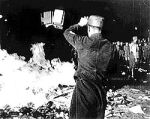 Ray Bradbury has been in the news lately, talking about the decline of books and libraries, so perhaps that’s why this book was on the trolley for re-shelving at the library, and perhaps that’s why I noticed it. I don’t read much SF but this is a beauty!
Ray Bradbury has been in the news lately, talking about the decline of books and libraries, so perhaps that’s why this book was on the trolley for re-shelving at the library, and perhaps that’s why I noticed it. I don’t read much SF but this is a beauty!
Written in 1953 in the shadow of the atom bomb and as television became widespread, Fahrenheit 451 is about a world where libraries no longer exist and books are illegal. Its hero, Montag, is a fireman whose job is not to put out fires, but to start them – to burn to the ground any house where books are found. The authorities have decreed that books are too unsettling, too dangerous for people to read, so they – and sometimes the people who read them – must be exterminated.
 Bradbury seems like a prophet now, when you read his vision of how the populace is subdued into accepting dull. mindless conformity. They are surrounded by constant sound and images, beamed through earphones and projected onto whole walls – radio and TV saturated with subliminal advertising messages so that people buy and buy and buy to satisfy consumer urges generated by memes. Montag’s wife Mildred spends her days watching the ‘relatives’ on the three walls of their parlour: the soap opera she watches is more real to her than real people. And she thinks she needs a fourth wall screen…
Bradbury seems like a prophet now, when you read his vision of how the populace is subdued into accepting dull. mindless conformity. They are surrounded by constant sound and images, beamed through earphones and projected onto whole walls – radio and TV saturated with subliminal advertising messages so that people buy and buy and buy to satisfy consumer urges generated by memes. Montag’s wife Mildred spends her days watching the ‘relatives’ on the three walls of their parlour: the soap opera she watches is more real to her than real people. And she thinks she needs a fourth wall screen…
 Mildred can’t remember anything of her personal life any more – not even where she met Montag – and she doesn’t talk to him because she’s constantly plugged into a tiny musical insert in her ear. Montag has to pull it out to get her to listen to him when he becomes troubled by what he sees. There are signs that she too is uneasy about what life has become but she has developed a habit of disassociation as a survival mechanism and he can’t get through to her.
Mildred can’t remember anything of her personal life any more – not even where she met Montag – and she doesn’t talk to him because she’s constantly plugged into a tiny musical insert in her ear. Montag has to pull it out to get her to listen to him when he becomes troubled by what he sees. There are signs that she too is uneasy about what life has become but she has developed a habit of disassociation as a survival mechanism and he can’t get through to her.
 Bradbury wrote this book during the Cold War when McCarthyism saw to it that certain books and films were censored or banned altogether. I am not sure if the Americans had book-burnings like the Nazis did but the effect was the same: state imposed restrictions on the dissemnination of ideas. The Religious Right is still doing it today, notoriously for preventing the teaching of evolution in southern states, but also for banning children’s books – everything from Madeleine L’Engle’s A Wrinkle in Time to the Harry Potter series. However, it is economics which is causing the tragic decline of libraries in the US today – because libraries are seen as easy targets for cost-cutting when budgets are tight…
Bradbury wrote this book during the Cold War when McCarthyism saw to it that certain books and films were censored or banned altogether. I am not sure if the Americans had book-burnings like the Nazis did but the effect was the same: state imposed restrictions on the dissemnination of ideas. The Religious Right is still doing it today, notoriously for preventing the teaching of evolution in southern states, but also for banning children’s books – everything from Madeleine L’Engle’s A Wrinkle in Time to the Harry Potter series. However, it is economics which is causing the tragic decline of libraries in the US today – because libraries are seen as easy targets for cost-cutting when budgets are tight…
 In Fahrenheit 451 the masses are lulled into a false sense of security to conceal the fact that nuclear warfare obliterates whole cities. Obsessive coverage of sport as patriotism is part of the entertainment that prevents people from talking to one another and sharing ideas, and family life is subverted by removing children to boarding schools for most of their lives. People are thus so disconnected that they no longer care when their neighbours are taken away and their homes burnt – and nobody cares when random substitutes are found for criminals so that the police can claim a 100% clearance rate. This book depicts the complete destruction of the idea of community and human relationships.
In Fahrenheit 451 the masses are lulled into a false sense of security to conceal the fact that nuclear warfare obliterates whole cities. Obsessive coverage of sport as patriotism is part of the entertainment that prevents people from talking to one another and sharing ideas, and family life is subverted by removing children to boarding schools for most of their lives. People are thus so disconnected that they no longer care when their neighbours are taken away and their homes burnt – and nobody cares when random substitutes are found for criminals so that the police can claim a 100% clearance rate. This book depicts the complete destruction of the idea of community and human relationships.
The intelligensia can only survive by leaving – and even that’s hard to do. To ensure that they are not hunted down, they can bring no books, but instead they memorise them. Each person carries a book in his head, memorised in its entirety, to be passed on to successive generations. They acknowledge that some will be lost, or changed a little, but enough will be saved: of Plato, Shakespeare, the Bible, Thoreau, Bertrand Russell, Machiavelli…
Unexpectedly, Fahrenheit 451 ends on a note of hope, that one day the thousands of people who reject the comfort and security of conformity will be able to bury war. That hasn’t happened yet, and books and libraries are still at risk, but there’s hope. There’s always hope.
It’s included in 1001 Books You Must Read Before You Die..
Author: Ray Bradbury
Title: Fahrenheit 451
Publisher: Harper 2008
ISBN: 9780006546061


Fine piece Lisa. Fahrenheit 451 was the book that took me from ‘boyhood’ reading into the deeper realms, so a nice trip down memory lane. It also sparked an involvement in the anti-nuclear movement that consumed nearly 20 years – powerful work. Hope always springs eternal.
LikeLike
By: Kevin Parker on July 19, 2009
at 9:06 am
It’s an amazing book: like 1984 in its presience. If only more people would read it, eh?
LikeLike
By: Lisa Hill on July 19, 2009
at 10:22 am
But it’s just sooo bad!!!
I read it at school, and there are so many better dystopic futures out there, like Nineteen Eighty-Four, that one shouldn’t waste their time on this.
Having said that, though, it has survived for quite a while, so there’s clearly something in there that speaks to people. As it did here, Lisa!
LikeLike
By: matttodd on July 19, 2009
at 3:47 pm
Is it his writing, or the message that you don’t like, Matt?
LikeLike
By: Lisa Hill on July 19, 2009
at 4:35 pm
Maybe a bit of both. To be honest, I haven’t read it for about 5 years, so it’s a bit fuzzy.
The writing wasn’t anything special, and I don’t know about the message. I just remember thinking that it’s the poor man’s dystopia. There are so many out there that are sharper, more cynical satire, and make you think more.
LikeLike
By: matttodd on July 21, 2009
at 9:33 pm
Well, might it be an appropriate introduction to the genre for high school students for that reason? I think, for example, that The Handmaid’s Tale by Margaret Atwood is a very sophisticated dystopia, but it’s perhaps better left for more mature reading so that its impact and the feminist agenda means more. That books are right for different times in our lives doesn’t detract from their worth, I think. (I always remember my mother talking about how we ‘grow out’ of’ Tschaikovsky’s Pathetique being a favourite symphony – yes, its maudlin style does appeal to gloomy adolescents, and we move on to liking the crisp elegance of Bach – but that doesn’t mean that the Pathetique is a ‘poor man’s symphony’, IMO. )
Perhaps the reason I thought Fahrenheit 451 was so prescient was because I grew up without television. From what I’ve heard, Bradbury was more concerned about the advent of commercial TV and the ads that support it than censorship in general. I do think that it was clever of him to foresee the rise of consumerism and the detachment of human relationships in the way that he did, all those years ago….
LikeLike
By: Lisa Hill on July 22, 2009
at 1:54 pm
[…] course it’s not enough. I’ve just read Fahrenheit 451 and loved it! Possibly related posts: (automatically generated)Proust, and bragging…Brooklyn by […]
LikeLike
By: Hmm, have I read enough American literature? « ANZ LitLovers LitBlog on July 31, 2009
at 7:41 pm
[…] – famously used in literature as the symbol of the Fire Department in Ray Bradbury’s Fahrenheit 451 – are fascinating little […]
LikeLike
By: The Salamanders, by William Lane | ANZ LitLovers LitBlog on March 4, 2017
at 3:29 am
[…] fantasy and SF.) I liked revisiting David Mitchell’s Cloud Atlas, Ray Bradbury’s Fahrenheit 451 and Margaret Atwood’s The Handmaid’s Tale but I was also interested to discover books […]
LikeLike
By: Literary Wonderlands, edited by Laura Miller #BookReview | ANZ LitLovers LitBlog on September 23, 2018
at 1:52 pm